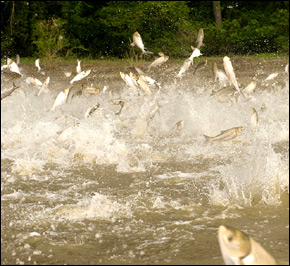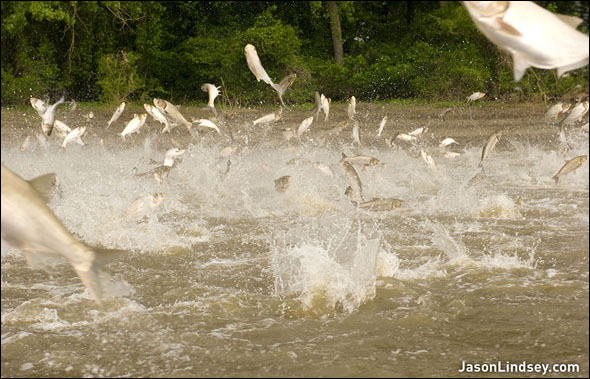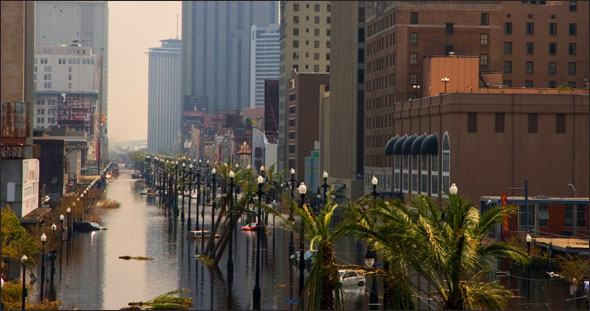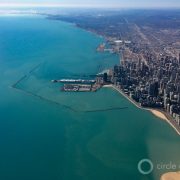Asian Carp Knocking at the Great Lakes’ Door; Michigan Attorney General Seeks To Slam It Shut
New threat to the lakes reopens century-old legal battle over diversion of Great Lakes water, draws support from several states and Ontario.
[flv:asian_carp_590_011110.flv 590 332]

by Steve Kellman
Circle of Blue
Asian carp, possibly the most devastating in a series of invasive species to threaten the Great Lakes ecosystem, may be a few short miles from Lake Michigan after a decade-long migration up the Mississippi River.
Michigan wants to slam the door shut on the voracious fish before they enter the Great Lakes and destroy the region’s $7-billion-a-year sport fishing industry or threaten the $16 billion spent on recreational boating each year.
To that end, the state’s Attorney General Michael Cox filed suit in the U.S. Supreme Court Dec. 21 demanding that Illinois close the Chicago-area shipping canals and locks that connect to Lake Michigan. Cox has also asked the court to take other steps to block the carp from making the leap into the planet’s most abundant freshwater source.
In the weeks since the suit was filed, the states of Indiana, Minnesota, Ohio and Wisconsin have announced their intent to file legal documents supporting Michigan’s move, and the Associated Press reported Monday that New York plans to follow suit.
Ontario’s attorney general has also filed a motion supporting Michigan’s action, according to the Toronto Star. The Canadian province borders four of the five Great Lakes — Superior, Huron, Erie and Ontario.
“Stopping Asian carp is an economic and environmental necessity for Michigan,” Cox said in a statement. “The Great Lakes are an irreplaceable resource. Thousands of jobs are at stake and we will not get a second chance once the carp enter Lake Michigan.”
The State of Illinois will fight the effort to shut down the canals, according to an Illinois business leader quoted by Crain’s Chicago Business. “We were asked by the Illinois attorney general to provide a sworn affidavit highlighting the economic impact of a potential lock closure,” said Jim Farrell, executive director of the Illinois Chamber of Commerce’s Infrastructure Council.
The American Waterways Operators, a national trade association for the tugboat, towboat and barge industry, estimates that closing the waterways would have a “severe impact” on Chicago-area businesses and the region’s economy. “Barges transport millions of dollars’ worth of essential goods and commodities — including the majority of the region’s road salt and home heating oil — on waterways that would be shut down if the area’s locks are closed,” the association said in a news release. Closing the locks would raise transportation costs sharply and threaten hundreds of jobs, the association warned.
New Threat, Old Debate
While the threat is new, Monday’s legal action is based on a century-old dispute between Michigan and Illinois regarding Chicago’s diversion of Lake Michigan water from the Great Lakes basin.
The Chicago Sanitary and Ship Canal, epicenter of the Asian carp battle, opened in 1900. It was built to divert the city’s sewage into the Illinois River and the Mississippi River system instead of Lake Michigan, the primary source of the city’s drinking water.
To make the diversion, engineers reversed the Chicago River’s natural flow away from the lake through a series of locks and pumping stations. While hailed as a marvel of engineering, the canal drew lawsuits from several states including Missouri, Michigan and New York — as well as the federal government — that claimed the diversion threatened downstream water users and lowered the Great Lakes’ water levels.
“We’re relying on a canal and a way of thinking that is directly out of the 1890s, quite literally,” said Joel Brammeier, president and CEO of the Chicago-based Alliance for the Great Lakes. “This was before ecology even existed as a science, much less an understanding of invasion biology.”
Sneaking Through
This is not the first time that the canal and the series of related waterways that have been built in subsequent years are involved in invasions of non-native species, Brammeier noted. Zebra mussels, Caspian Sea natives that probably entered the Great Lakes via the ballast water from oceangoing ships, used the canal to get into the Mississippi River system and make their way south to the Gulf of Mexico.
“It is unfortunately a two-way street,” Brammeier said.
The latest threat — Asian carp — began their relentless march north along the Mississippi River decades ago, after being imported for use in Southern states to clean the ponds of catfish farmers in the 1970s. Government workers were also experimenting with the fish as a way to control weeds and dispose of sewage.
The fish proved dangerously effective at eating and reproducing in their new home, with the bighead carp variety eating up to 40 percent of its weight each day and growing to 100 pounds and four feet long.
Once the carp got into the wild, they began driving out native fish species that anglers covet, eventually dominating entire stretches of the Mississippi and Illinois rivers. The silver carp variety’s habit of jumping several feet out of the water into the path of motorboats — and their pilots and passengers — makes recreational boating a dangerous proposition in infested areas, with many injuries reported.
A 2007 study by the Great Lakes Commission found that the 4.3 million recreational boats registered in the eight Great Lakes states generate nearly $16 billion in spending every year. That spending directly supports 107,000 jobs, and indirectly supports nearly a quarter million jobs when secondary impacts are taken into account.
Flying Fish
Given the danger that flying Asian carp pose to boaters, Brammeier said they could do serious damage to the region’s recreational boating economy.
“If you can’t get out of the harbor without having 100 silver carp fly up and hit you and your kids in the face, you’re going to be a lot less likely to head out onto the water,” he said.
While the U.S. Army Corps of Engineers has erected an electric fish barrier on the canals to keep the carp from getting into the lakes, DNA tests last month showed that the carp may have crossed the barrier and are now within six miles of Lake Michigan.
“The actions of Illinois and federal authorities have not been enough to assure us the lakes are safe,” Cox said. “That’s why the waterways must be shut down until we are assured that Michigan will be protected.”
Cox Acts
Michigan’s attorney general is seeking several immediate remedies from the court through a motion for a preliminary injunction, including closure of the two navigational locks at the O’Brien Lock and Dam and Chicago Controlling Works.
“Michigan realizes that an interim order closing the locks will impact the barge traffic and recreational boats that move between Lake Michigan and the waterways in and around Chicago,” the injunction reads. “However, any such loss is relatively minor and is finite. If the Asian carp enter the Great Lakes system, the damage to the environment and economies of the Great Lakes states and Canadian provinces will be staggering with no practical end in sight.”
Cox also wants to reopen the legal case stemming from the canal’s original construction to recognize the threat that Asian carp pose to the Great Lakes as well as permanently close off the Illinois River basin from the lakes.
“I’m seeing a shift in the discussion to whether this canal is moving from being an asset to a liability,” Brammeier said. “I would say ‘Yes’.”
Legal Assessment
Noah Hall, an assistant professor of law at Wayne State University Law School and the founder and executive director of the Great Lakes Environmental Law Center, said “Michigan makes a compelling case” for closing the locks.
The suit is “a classic interstate nuisance dispute,” Hall wrote recently in a blog posting on the issue. “While the implications of this case are tremendous, the background legal issues involved are fairly well-settled.”
The Supreme Court will need to balance the competing interests of Illinois in keeping the Chicago Sanitary and Ship Canal open for shipping against the interests of Michigan in protecting the lakes and their fisheries from the invasive species.
Closing the locks will cost the shipping industry “tens of millions of dollars,” Hall wrote, while the potential cost to the fisheries runs into the billions. Given that, he wrote, “it seems that Michigan can clearly demonstrate that the potential harm from the Asian carp invading the Great Lakes far outweighs the costs and burdens of closing the canal locks.”
While Cox is running for the Republican nomination to be Michigan’s next governor, Hall said the suit does not have the hallmarks of a political stunt.
“Mike Cox is no political novice, and it would be simple to dismiss this lawsuit as a political move to gain support from Michigan’s many fisherman and boaters who are terrified of Asian carp invading the Great Lakes,” he wrote.
“But Mike Cox has a strong record of legal action to protect the Great Lakes from invasive species. And more importantly, the petition and other filings demonstrate that the Attorney General has a through, well-researched, and persuasive legal argument.”
Hall has called for closing the canals and a permanent restoration of the original divide between the Mississippi River basin and the Great Lakes. Through the Great Lakes Environmental Law Center, he is working with two Michigan lawmakers on a friend of the court brief to file in support of the attorney general’s position seeking closure of the shipping canals. The legislators — Senator Patty Birkholz (R-Saugatuck Township), chair of the Senate Natural Resources and Environmental Affairs Committee, and Representative Rebekah Warren (D-Ann Arbor), chair of the House Great Lakes and Environment Committee — have both backed Great Lakes protection legislation in the past.
The Supreme Court is expected take up Cox’s lawsuit in a closed conference Jan. 15, according to Minnesota Public Radio. While a decision on the preliminary injunction request to close the locks could come quickly, Brammeier said, the attorney general’s longer-term goal of severing the link between the Great Lakes and the Illinois River altogether will probably require the appointment of a special master, who will need time to gather facts in the case and make a recommendation to the court.
Steve Kellman is a Circle of Blue writer and reporter. Reach him at circleofblue.org/contact.
Sources: Milwaukee Journal-Sentinel, Michigan Attorney General Michael Cox, Noah Hall, Great Lakes Law Blog







The clock is ticking. The everglades are now host to non indiginous pythons and other toss-away pets, zebra mussels clogging waterway s, these carp introduced under the name of science, Love Canal NY state, 25 years ago the US Army Corp of Engineers almost opened up a canal to aid Mississippi R. tug and barge shipping. Had that been done New Orleans would have been just a memory after hurricane Katrina. The Great Lakes water level is lowest on record for the last 5 plus years now.
Introduction of non-indiginous species of any kind into anywhere in North America was/is folly upsetting the balance of nature. Now is the profound question as to how to wind back the hands of time or more realisicitly “How to Correct or Control” these threatning issues at hand. Can we or is it too late?
These problems affect the worlds largest supply of fresh water shared by two nations of which countless rivers and tributaries drain into. Truely massive efforts must be implemented to all these maladies before it is beyond reproach.
Something MUST be done to prevent to invasion of the asian Carp into The great lakes! I heard that president OBama said it wasn’t feasible to stop these fish by closing the waterways that would allow these invasive fish into the Great Lakes-he must be wrong, we cannot just sit by and allow them a key to these beautiful ,freshwater lakes. If allowed into the Great Lakes we can’t turn the clock-it will be over! They would destroy the habitat of our native fish and ,in turn,destroy our native fish and the fisheries and sport fishing that the native fish support.The recreation enjoyed by so many from Michigan and many other states would be gone as we now know it. Can you imagine waterskiing, windsailing, any form of boating and jet skiing and so many other things to numerous to mention and being smacked in the face or head by a big asian Carp. It would ruin the enjoyment of the lakes it would ruin the tourist trade and the jobs and economy would sink or dissapear. These fish Must be STOPPED! We had better be more careful in allowing foreign species into this country . We should have learned from past misstakes that it doesn’t work. Our native species take a hit and lose out to the invasive species most of the time. PLE ASE,we must protect our valuable resource~ THE GREAT LAKES~ lets keep them that way. gael tryles
Another problem that the southern fish farmers pose is the interstate transportation of fish using natural waters.
As bills like H.R.3669 address the problems of invasive species by private pet owners, it should be noted that fish farmers have had meetings with officials of the Federal government discussing their belief that waters of fish being brought into our country need to be considered for problems. As industry will play an important role in helping keep our waters clean, problems including interstate transportation with no federal endorsement, disease, virus, invasive and chemical use are all problematic as fish farmers move their fish across state lines without considering the quality of water used or what is added. If legislation to eliminate exotic species and ornamental fish from being imported into our country is enacted domestic production and the transportation problems should increase. This water often ends back in our natural waters. Some fish farmers will deliver fish through fed –ex by air to all states. They even have a bait fish that has a patent pending that will live in salt or fresh water, which they will deliver this way. The Presidents Ocean and great lakes initiative is aware of this problem and how states such as mine did not bother to address water as problematic so long as the fish had an inspection using an international standard of fish testing with in the last year in another state out of any jurisdiction without regard for the water. Fish transported and sold in the US often change hands many different times with many different water changes and chemicals used without regard for state laws during transportation. In some states such as NY they can be brought into the state from anywhere in the country without worrying about water disposal. I have seen the transport water and it is often milky, suds, full of scales, dead fish, invasive (crabs, polliwog, etc.) with the possibility of pathogens and virus. In the mid 1990’s as the fish being delivered from Arkansas to me were dying of disease, it was not uncommon to see bait fish, ornamental s, food fish on the same truck being spread out from tank to tank as space was freed up, as I know I often added more water to take them to their next delivery. This water and the fish are often unloaded from tanks on trucks through pipes to tanks fed by natural water where the overflow is back into natural waters. I am in the industry and do believe that mandatory safe procedures can solve this and made many ignored suggestions to my state. As high level administration officials that now negotiate trade with China involving water movement through ballast systems, did not recognize virus and pathogens in natural waters for fish transport when they were involved as a senator in NY, despite knowing that our state university helping formulate policy about bait fish was busy studying virus in water, with a grant, I doubt whether they will care about the dangers of ballast water or the carbon footprints associated with bring foreign products into our country in order to keep our large retail employers shelves filled with foreign manufactured products.
It should be noted in history despite the historic legislation passed by the House of representatives in 2008 to curtail ballast water introduction of virus and pathogens in American waters, ( that was rejected in the 2008 because of fear it would override individual state rights to stronger legislation), this Administration has failed to address ballast water as the economic recovery begins to increase the amount of shipping activity, other than threw the week Coast Guard 2 decade purposed plan which mirrors another international organization made up of foreign countries, foreign sea captains, and foreign countries (IMO). It should also be noted that a military plan rather than legislation is subject to delay and change by the next commander and chief. To allow this to happen with insufficient protection, is the same way that the last president to address ballast water on a national level did prior to 2001, and it was then, ignoring national security and is now still ignoring national security.